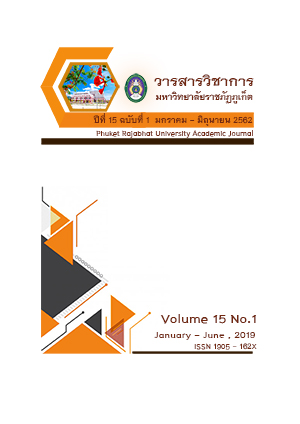การบริหารการคลังขององค์กรปกครองส่วนท้องถิ่นจังหวัดภูเก็ต
Main Article Content
บทคัดย่อ
การศึกษาวิจัยนี้มีวัตถุประสงค์เพื่อศึกษาสภาพการบริหารการคลังขององค์กรปกครองส่วนท้องถิ่นในจังหวัดภูเก็ต เพื่อศึกษาปัญหาการบริหารการคลังขององค์กรปกครองส่วนท้องถิ่นในจังหวัดภูเก็ต และเพื่อศึกษาแนวทางที่เหมาะสมในการบริหารการคลังสำหรับองค์กรปกครองส่วนท้องถิ่นในจังหวัดภูเก็ต เป็นการวิจัยเชิงคุณภาพ (Qualitative Research) โดยการศึกษาจากเอกสาร (Documentary Study) และการสัมภาษณ์เชิงลึก (In-depth Interview) โดยกำหนดกลุ่มตัวอย่างที่เป็นตัวแทนขององค์กรปกครองส่วนท้องถิ่นแต่ละรูปแบบในจังหวัดภูเก็ตโดยเฉพาะองค์กรปกครองส่วนท้องถิ่นที่มีแหล่งท่องเที่ยวที่สำคัญ จำนวน 6 แห่ง เพื่อทำการวิเคราะห์และสังเคราะห์ข้อมูล เพื่อสร้างแนวทางการบริหารการคลังขององค์กรปกครองส่วนท้องถิ่นจังหวัดภูเก็ต
ผลการวิจัยพบว่า สภาพการบริหารการคลังขององค์กรปกครองส่วนท้องถิ่นของจังหวัดภูเก็ตในปัจจุบันยังคงใช้การบริหารการคลังแบบสมดุลหรือเกินดุล ซึ่งส่งผลต่อการดำเนินนโยบายที่อาจไม่เหมาะสมหรือไม่ก่อให้เกิดประโยชน์อย่างเต็มที่ต่อการพัฒนาท้องถิ่นเนื่องจากไม่ได้มีการใช้ทรัพยากรด้านการเงินอย่างมีประสิทธิภาพ ปัญหาและอุปสรรคต่อการบริหารการคลังขององค์กรปกครองส่วนท้องถิ่นในจังหวัดภูเก็ต ได้แก่ ปัญหาเกี่ยวกับอัตราภาษีและฐานภาษี การขาดฐานข้อมูลภาษีท้องถิ่น ปัญหาเกี่ยวกับบุคลากรขององค์กรปกครองส่วนท้องถิ่น การจัดเก็บรายได้ไม่เต็มที่ ปัญหาเกี่ยวกับการทำแผนงบประมาณรายจ่าย ปัญหาเกี่ยวกับการบริหารรายจ่าย ปัญหาเกี่ยวกับทัศนคติและความเข้าใจในการเสียภาษีท้องถิ่น และปัญหาเกี่ยวกับความคาดหวังต่อการตอบสนองการพัฒนาท้องถิ่น แนวทางการบริหารการคลังที่เหมาะสมต่อองค์กรปกครองส่วนท้องถิ่นจังหวัดภูเก็ต มีอยู่ 2 มิติ ได้แก่ 1) การเพิ่มสมรรถนะการบริหารจัดการการคลัง ประกอบด้วย การพัฒนาระบบฐานข้อมูลและกระบวนการจัดเก็บภาษีการพัฒนาด้านรายได้ของท้องถิ่นการปรับปรุงประสิทธิภาพด้านรายจ่าย และการเสริมสร้างขีดความสามารถในการจัดบริการสาธารณะในระยะปานกลางและระยะยาว และ 2) การปรับบทบาทเชิงสถาบันและนโยบาย ประกอบด้วยการสร้างมาตรการทางการคลังที่เหมาะสมและสอดคล้องกับบรรยากาศทางการเมืองเพื่อลดแรงต้านทางภาษีการสร้างเครือข่ายเพื่อการพัฒนาเมืองภูเก็ต การทบทวนเกณฑ์การจัดประเภทภาษีอากรต่างๆ ให้เหมาะสมกับองค์กรปกครองโดยคำนึงถึงพื้นที่ และการปรับปรุงสัดส่วนรายได้ขององค์กรปกครองส่วนท้องถิ่นต่อรายได้สุทธิของรัฐบาล
Article Details
เนื้อหาและข้อมูลในบทความที่ลงตีพิมพ์ในวารสารวิชาการมหาวิทยาลัยราชภัฏภูเก็ต ถือเป็นข้อคิดเห็นและความรับผิดชอบของผู้เขียนบทความโดยตรง ซึ่งกองบรรณาธิการวารสารฯ ไม่จำเป็นต้องเห็นด้วยหรือร่วมรับผิดชอบใด ๆ
บทความ ข้อมูล เนื้อหา รูปภาพ ฯลฯ ที่ได้รับการตีพิมพ์ในวารสารวิชาการมหาวิทยาลัยราชภัฏภูเก็ต ถือเป็นลิขสิทธิ์ของวารสารวิชาการมหาวิทยาลัยราชภัฏภูเก็ต หากบุคคลหรือหน่วยงานใดต้องการนำทั้งหมดหรือส่วนหนึ่งส่วนใดไปเผยแพร่ต่อหรือเพื่อกระทำการใด ๆ จะต้องได้รับอนุญาตเป็นลายลักษณ์อักษรจากวารสารวิชาการมหาวิทยาลัยราชภัฏภูเก็ตก่อนเท่านั้น
เอกสารอ้างอิง
ดิเรก ปัทมสิริวัฒน์. (2553). นโยบายการคลังสาธารณะ. กรุงเทพฯ: แปลนพริ้นติ้ง.
วีระศักดิ์ เครือเทพ. (2551). การวิเคราะห์ความเข้มแข็งทางการคลังของเทศบาล:รายงานการวิจัยฉบับสมบูรณ์.กรุงเทพฯ: ภาควิชารัฐประศาสนศาสตร์ คณะรัฐศาสตร์ จุฬาลงกรณ์มหาวิทยาลัย.
สกนธ์ วรัญญูวัฒนา. (2556). การกระจายอำนาจการคลังสู่องค์กรปกครองส่วนท้องถิ่น: แนวคิดและการปฏิบัติกรณีศึกษาประเทศไทย..กรุงเทพฯ : มหาวิทยาลัยธรรมศาสตร์.
สำนักงานพาณิชย์จังหวัดภูเก็ต ศูนย์ข้อมูลการค้าจังหวัด. (2560). สรุปภาวะเศรษฐกิจการค้าจังหวัดภูเก็ต ปี 2560. [Online] Available: http://pcocmartsch.moc.go.th/index.aspx
สำนักงานส่งเสริมการปกครองท้องถิ่นภูเก็ต (2560). แผนพัฒนาจังหวัดภูเก็ต 4 ปี (พ.ศ.2561-2564). [Online] Available:http://www.phuket.go.th/webpk/contents.php?str=plan (2555, 20 ตุลาคม)
สำนักบริหารคลังท้องถิ่น กรมส่งเสริมการปกครองท้องถิ่น (2560) ข้อมูลด้านการเงินการคลังท้องถิ่น. [Online] Available: http://www.dla.go.th/work/money/index.jsp
Bahl, R., Johannes F. L., & Johannes F. (1992). Urban public finance in developing countries. Washington, DC: Oxford University Press.
Christopher Hood, A public management for all seasons,(Public Administration, (69), 1991), pp. 3-19.
Fenwick, J. (1995). Managing local government. Retrieved from http://nrl.northumbria.ac.uk/3320/.
Garber, J.A. (1997). Reinventing what?: The uncertain context of local government in Austria, Germany and Switzerland. New York: Stage.
Groves, S. M., & Valente, M. G. (1994). Evaluating financial condition: A handbook for local government. Washington, DC: City Management Association.
Honadle, B. W., Costa, J. M., & Cigler, B. A. (2004). Fiscal health for local governments: an introduction to concepts, practical analysis, and strategies. California: Elsevier Academic Press.
Musgrave, R. A. (1959). Theory of public finance; A study in public economy. New York: McGraw-Hill.
Tannenwald, R. (1998). Come the devolution: Will States be able to respond?. New England Economic Review. (2), 53-73.
Wang, S. (2006). Money and autonomy: Patterns of civil society finance and their implications. Studies in Comparative International Development, 40(4), 3-29.
U.S.Government Accountability Office (GAO). (2005).Assessing the acquisition function at federal agencies. Retrieved September 8, 2013, http://www.gao.gov/assets/80/76901.pdf


